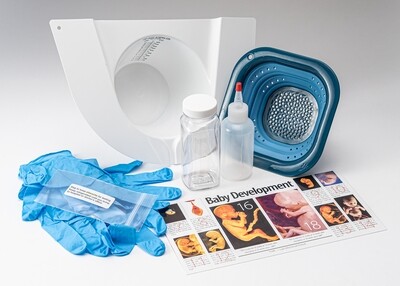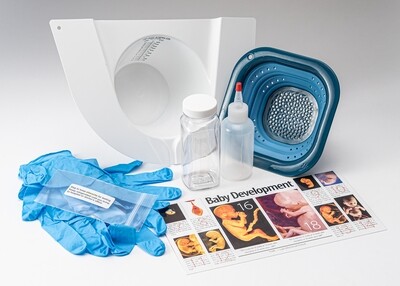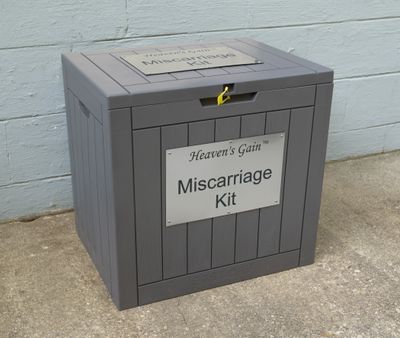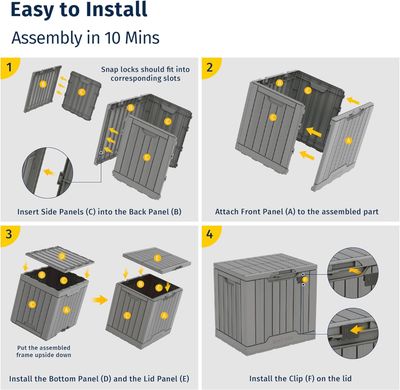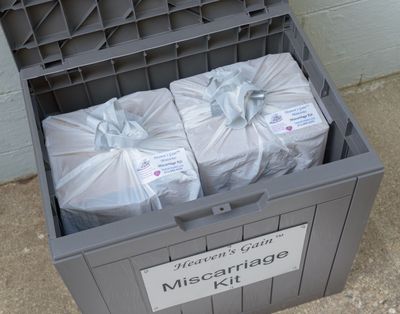Miscarriage Kits
The purpose of the miscarriage kit is to collect the baby and placenta, and to measure blood loss. There is a video for instruction on this page and written directions below.
Orders are shipped daily Monday through Friday when received by noon, EST.
We recommend FedEx 2-day Express or Express Priority Overnight for a guaranteed delivery date.
Free Miscarriage Kit Pick Up Locations
Depending on the situation, we know women don’t always have time to wait for shipping when they need a miscarriage kit.
If you need a kit right away, please pick up a free kit from the following locations and call our hotline for usage instructions (513-888-4200). You do NOT have to be a member of the church or associated with the organization to pick up this miscarriage kit; it is a free gift to you. Some Lawn Boxes are locked with a one-use lock with no combination. If that is the case, scissors to cut the lock can be found on the back of the box. There is no need to relock the box.
If you are not near a pick-up location, call our hotline (513-888-4200) and we can help you assemble a makeshift at-home kit.
Interested in getting a miscarriage kit lawn box at your parish, church, or organization? Read the introductory letter here and/or email chaney@heavensgain.org.
Client Directions for Using the Miscarriage Kit
(For instructions with photos, see link to PDF above)
***Note: This is for informational & educational purposes only, it does not substitute for medical advice or consultations with healthcare professionals.
Heaven’s Gain Miscarriage Kit Includes:
- All contents except specimen pan are in a pink resealable bag
- White collection pan to measure blood loss
- A squirt bottle to rinse the colander contents
- Colander to catch the baby in its own plastic bag
- A vessel, saline packet(s), and a drawstring bag vessel cover
- Pictures of baby development and QR codes
- Disposable gloves
- Blood loss measurement chart
- A bag to place the placenta in for possible chromosomal testing
- Pamphlets and a brochure
Finding Your Baby:
- Once you start bleeding more than just spotting, bring the miscarriage kit into the bathroom with you.
- Remove the contents of the miscarriage kit.
- Fill the squirt bottle with water.
- Put on the gloves, if you choose to use them.
- Place the collection pan in the toilet to measure blood loss. Remove during urination.
- Expand the blue colander by gently pushing down the center area & place it in the white collection pan. NOTE: During urination, the blood collection pan is removed, but you will need to hold the colander to catch anything that may pass as you urinate. Use of the colander will allow your urine to pass through while retaining clots.
- Once you see contents in the colander, bring only the colander to the sink. Leave the collection pan on the toilet except for measuring blood loss. Use the squirt bottle to rinse off the blood to reveal the contents in the colander at the sink.
- If there are any contents in the strainer, examine those contents.
- Discern and distinguish blood clots from the placenta, sack, cord, and baby. Use the pictures of baby development to find the baby. Please understand, your baby may not look the same due to chromosomal abnormalities or decomposition that may have begun.
- Each time you empty the collection pan, record the amount of blood loss onto the blood loss chart.
- Repeat until the baby and placenta have passed. This may take many trips to the bathroom. If you do not find the baby, clean the colander and let it dry. Discard gloves and place the colander back in the large storage bag until the next trip to the bathroom. Start the process again on the next trip to the bathroom.
- Finding your baby’s body does not always happen. Breakdown sometimes happens before delivery. If you want to preserve anything you do find for a burial, you can use the vessel and cover as a preservation method.
Finding the Placenta:
- The placenta is usually thicker than a clot. One side is bloody while the other side is iridescent, and you can usually see some veins. The placenta can be placed in the bag for future testing or to be viewed by the doctor. If you are having genetic testing, put the placenta in the small resealable bag, and refrigerate it until you can bring it to the hospital or doctor. If not choosing to test, you may dispose of the placenta in the toilet.
Preparation and Use of the Vessel for the Saline Bath Technique:
- Your baby’s body is fragile and difficult to keep safe. We recommend using Saline Bath Technique with the vessel included n the kit. This creates a womb like environment for your baby while allowing you to hold and view your baby safely.
- Your vessel includes one or more saline packets. The saline keeps the fragile baby’s body safe and allows you to view the baby. Mix the saline and water (preferably distilled water) in the vessel. After carefully rinsing your baby in the colander, carefully place the baby in the vessel of saline water. If you don’t want to mix your own saline, contact solutions is an acceptable alternative.
- Screw the lid on the vessel tightly and lay it on its side. Observe your baby peacefully floating in saline solution. This will recreate a womb-like environment. You may wish to take pictures.
- When not viewing the baby, please keep the baby in the vessel in the refrigerator or a cooler until burial.
- The water may become slightly pink over time. If you want to change the water, you can use the colander to gently dump out the water and refill it with fresh saline water.
Support Information:
- Miscarriage caskets for burial can be found at https://heavensgain.org/1st-trimester-miscarriage-caskets/
- Call our hotline (513) 888-4200 8am-midnight Eastern to reach one of our Advocates for Parents of Perinatal Loss™ (APPL).
- Your assigned APPL™ can prepare you for the miscarriage and is available via phone during the miscarriage. APPL’s are advocates only and do not provide any medical advice. Please contact your doctor with all medical questions.
- All support services are free. Please refer to the enclosed brochure for more information.
- More information on support services can be found at https://heavensgain.org/services-2/
- Group support is available on the second Thursday of each month on Zoom. Call (513) 619-0100 for more information about available group support, and to access the Zoom ID + password.
- Individual and couple support is also available.
To parents who are experiencing the loss of a baby…
We are so sorry that your baby has died. Those of us involved in the Heaven’s Gain ministry understand first-hand how devastating a miscarriage can be, and are sorry for all you are going through.
We pray daily for those experiencing miscarriage, stillbirth, and infant loss. We are called to this ministry so that all parents have respectful delivery options, and the chance to grieve for their child. When facing decisions about fetal or infant loss, parents should be fully informed and not be rushed into any decisions. Naturally, we advise you to listen to your doctor’s advice. Usually there is enough time to consider many of the necessary choices.
We would like to make a few recommendations that we hope will help as you grieve and heal:
Pray to God for physical emotional and spiritual strength as you deliver your miscarried baby.
While you are waiting, ask your doctor about the warning signs for medical issues such as excessive bleeding, fever, or infection. Waiting for the baby to deliver can be very frustrating. Wondering when the baby will deliver and what will happen can make you anxious.
Please understand it is not unusual for a baby to deliver as long as three to four weeks after he or she has died. The placenta usually keeps growing until the baby delivers.
To prepare for the delivery, you can buy a miscarriage kit from this site, or create your own. We recommend an expandable colander, squirt bottle, re-sealable plastic bag for storage of placenta, a vessel in which to place the baby, and rubber gloves. You may also want to locate a picture of a baby the age and size of your baby at the same gestational age.
Below is our recommendation for using the miscarriage kit. Consult with your doctor for his/her medical direction.
Please note: this information is not medical advice. For all medical questions, contact your physician. Your doctor may suggest delivering in a hospital if you experience symptoms like excessive bleeding, fever, or infection. Ask your doctor what to watch for, as some symptoms may be life-threatening.


